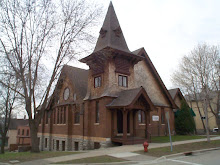[Tony] So, I love my seminary classes because of the things that I get to write about. I recently wrote a paper emphasizing the imperative need to address Christian social ministry within the context of community, arguing that an approach to Christian social ministry that occurs outside of the collective body of believers is inherently extremely limited in its ability to pursue deep, holistic social ministry. Anyway, I want to share the conclusion to this particular paper as it reminded me so much of the gift that God has given to us through the community that has been the heart of Ekklesiah. This is a response to a book by Derrel Watkins- to clarify the mention of the name in the paragraph below. Above all, writing this reminded me of how much I have fallen in love with the people I get to "do" community with, share in Christ with, and live out good news of eternal life that starts now with. Enjoy!
"To be a Christian is to believe that both Christ and the Gospels are still alive and relevant. The “good news” of Christ is not simply news of life after death, instead it is news of life before death, heaven on earth. It is news that through Christ, God is currently establishing His kingdom on earth as it is in heaven. The “good news” is news that is relevant now. Christian social ministry must see itself as an element of Christ's community of believers. As Christians, we are all called to collectively share the burden of “social ministry” however, it must also be understood that “social ministry” refers to the social repercussions of many living within the world but not of it, identifying themselves as the living body of Christ who is still bringing good news to the poor, is still proclaiming liberties to the captives, still recovering the sight of the blind, still setting at liberty those who are oppressed, and still proclaiming the year of the Lord's favor. The Christian community, like Jesus' original disciples, is not called to be extraordinary on its own, limited by a prerequisite of ability and skill. Instead, those within the community are called to be ordinary men and women made extraordinary through Christ. Watkins fails to acknowledge that within the single entity of the Christian community, whether we are marked by prolific need or by a substantial ability to give generously, we are all called to participate in social ministry. Social ministry within the Christian community perceives the least within it, the “client,” as the greatest asset. The “client” is the identity of Christ, for it is in the presence of the “client” that we interact most intimately with the presence of Christ."
Subscribe to:
Post Comments (Atom)










2 comments:
Will you unpack what you mean by client? What is the significance of this word choice?
"client" is actually a word used by the author of the book that I am criticizing. Believe me, in a book titled Christian Social Ministry, my heart sank when I read the word "client" in reference to the needy. The depth to which the use of this word creates an us/them, good/bad, deserving/undeserving mentality is incredible and that is one of the main points that the rest of my paper addressed. It kind of makes me sick when people segregate themselves based on a perception of degrees of need. That mentality destroys community, destroys the ability for the body of Christ to be what it can and should be, and it completely ignores the fact that, before God, there is not a single one of us that isn't as needy as the next. (p.s. I was a little aggravated with this particular book if you couldn't tell=)
Post a Comment